- קר cognate permutations (covering/uncovering having impact)
We begin with two-letter words listed in Strongs. We will mention a lot of words. This is not a vocabulary lesson, but just to make you aware that this is a very important Scriptural topic, hidden in many places throughout.
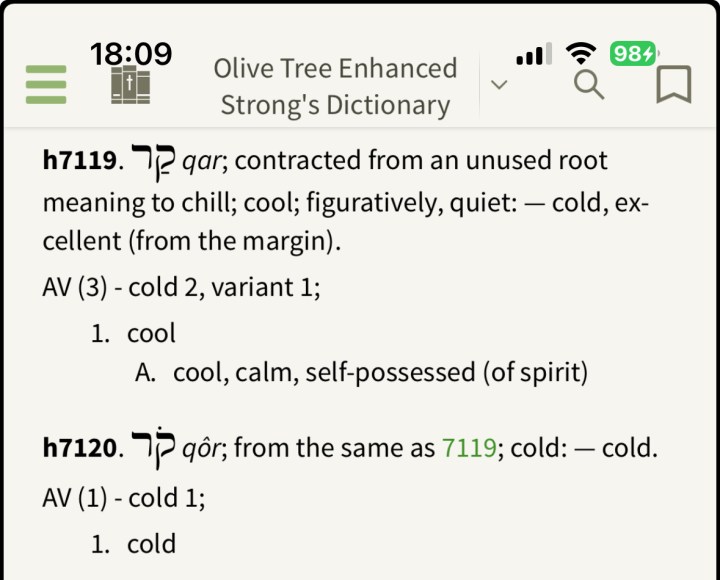

▸ h7556. רָקַק râqaq; a primitive root; to spit: — spit.
AV (1) – spit 1;
(Qal) to spit
- Some other important words that include this two-letter group:
⦁ Genesis 1:6-8 NKJV
6 Then God said, “Let there be a firmament (h7549. רָקִיעַ râqîya‘) in the midst of the waters, and let it divide the waters from the waters.” 7 Thus God made the firmament(h7549. רָקִיעַ râqîya‘), and divided the waters which were under the firmament(h7549. רָקִיעַ râqîya‘) from the waters which were above the firmament (h7549. רָקִיעַ râqîya‘); and it was so. 8 And God called (h7121. קָרָא qârâ’) the firmament (h7549. רָקִיעַ râqîya‘) Heaven. So the evening and the morning were the second day.
- NB – “And God called the firmament heaven.”
⦁ Genesis 1:14-20 NKJV
14 Then God said, “Let there be lights in the firmament (h7549. רָקִיעַ râqîya‘) of the heavens to divide the day from the night; and let them be for signs and seasons, and for days and years; 15 and let them be for lights in the firmament of the heavens to give light on the earth”; and it was so. 16 Then God made two great lights: the greater light to rule the day, and the lesser light to rule the night. He made the stars also. 17 God set them in the firmament (h7549. רָקִיעַ râqîya‘) of the heavens to give light on the earth, 18 and to rule over the day and over the night, and to divide the light from the darkness. And God saw that it was good. 19 So the evening and the morning were the fourth day.
20 Then God said, “Let the waters abound with an abundance of living creatures, and let birds fly above the earth across the face of the firmament (h7549. רָקִיעַ râqîya‘) of the heavens.”
⦁ Genesis 1:11-12
11 Then God said, “Let the earth bring forth grass, the herb yielding (מַזְרִ֤יעַ) seed, and the fruit (h6529. פְּרִי p̱erîy) tree making fruit (h6529. פְּרִי p̱erîy) according to its kind, whose seed is in itself, on the earth”; and it was so. 12 And the earth brought forth grass, the herb yielding (מַזְרִ֤יעַ) seed according to its kind, and the tree making fruit(h6529. פְּרִי p̱erîy), whose seed is in itself according to its kind. And God sees (וַיַּ֥רְא) that it was good.
⦁ Genesis 1:11-12
11 וַיֹּ֣אמֶר אֱלֹהִ֗ים תַּֽדְשֵׁ֤א הָאָ֨רֶץ֙ דֶּ֔שֶׁא עֵ֚שֶׂב מַזְרִ֣יעַ זֶ֔רַע עֵ֣ץ פְּרִ֞י עֹ֤שֶׂה פְּרִי֙ לְמִינֹ֔ו אֲשֶׁ֥ר זַרְעוֹ־בֹ֖ו עַל־הָאָ֑רֶץ וַֽיְהִי־כֵֽן׃
12 וַתּוֹצֵ֨א הָאָ֜רֶץ דֶּ֠שֶׁא עֵ֣שֶׂב מַזְרִ֤יעַ זֶ֨רַע֙ לְמִינֵ֔הוּ וְעֵ֧ץ עֹֽשֶׂה־פְּרִ֛י אֲשֶׁ֥ר זַרְעוֹ־בֹ֖ו לְמִינֵ֑הוּ וַיַּ֥רְא אֱלֹהִ֖ים כִּי־טֹֽוב׃
- Above was not a full investigation/dissection, just a look at the obvious, important words including this cognate permutation group in the first few verses of Scripture. This idea of “covering or uncovering having an impact” on life on this good earth must be an important one.
Some other words we have noticed include:
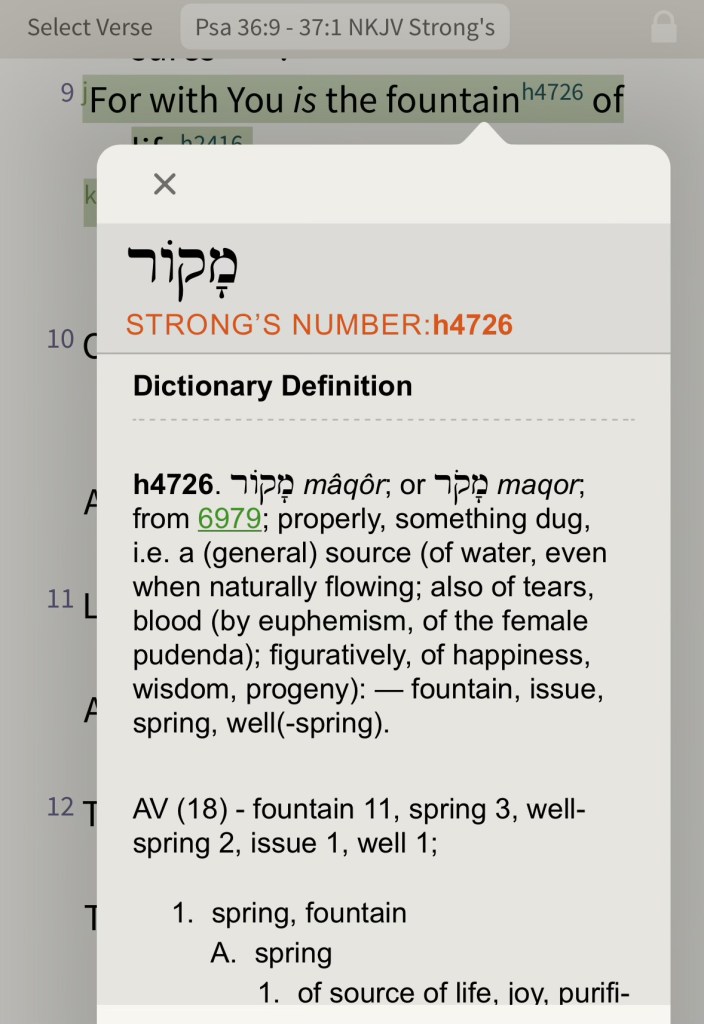
(Note, this is not the only word for fountain in TaNaKh.)
Of course, Israel includes a קר cognate permutation, which includes יר and כר.
▸ h7130. קֶרֶב qereḇ; from 7126; properly, the nearest part, i.e. the center, whether literal, figurative or adverbial (especially with preposition): — x among, x before, bowels, x unto charge, + eat (up), x heart, x him, x in, inward (x -ly, part, -s, thought), midst, + out of, purtenance, x therein, x through, x within self.
AV (227) – among 76, midst 73, within 24, inwards 22, in 6, misc 26;
- midst, among, inner part, middle
- inward part
- physical sense
- as seat of thought and emotion
- as faculty of thought and emotion
- in the midst, among, from among (of a number of persons)
- entrails (of sacrificial animals)
- inward part
h7131. קָרֵב qârêḇ; from 7126; near: — approach, come (near, nigh), draw near.
AV (11) – come nigh 4, come near 3, draw near 2, approach 1, came 1;
- near, approaching
▸ h7132. קְרָבָה qerâḇâ; from 7126; approach: — approaching, draw near.
AV (2) – draw near 1, approach 1;
- an approach, a drawing near
▸ h7133. קָרְבָּן qorḇân; or קֻרְבָּן qurban; from 7126; something brought near the altar, i.e. a sacrificial present: — oblation, that is offered, offering.
AV (82) – offering 68, oblation 12, offered 1, sacrifice 1;
- offering, oblation
h7134. קַרְדֹּם qarḏôm; perhaps from 6923 in the sense of striking upon; an axe: — ax.
AV (5) – axe 5;
- axe
h7135. קָרָה qârâ; feminine of 7119; coolness: — cold.
AV (5) – cold 5;
- cold
▸ h7136. קָרָה qârâh; a primitive root; to light upon (chiefly by accident); causatively, to bring about; specifically, to impose timbers (for roof or floor): — appoint, lay (make) beams, befall, bring, come (to pass unto), floor, (hap) was, happen (unto), meet, send good speed.
AV (27) – happen 7, meet 5, beams 4, befall 3, brought 1, misc 7;
- to encounter, meet, befall, happen, come to meet
- (Qal)
- to encounter, meet
- to befall
- (Niphal)
- to encounter, meet (without pre-arrangement)
- to chance to be present
- to come to meet
- (Hiphil) to cause to meet, appoint
- (Qal)
- to build with beams
- (Piel) to lay the beams of, furnish with beams
▸ h7137. קָרֶה qâreh; from 7136; an (unfortunate) occurrence, i.e. some accidental (ceremonial) disqualification: — uncleanness that chanceth.
AV (1) – uncleanness that chanceth 1;
- chance, accident
- of nocturnal pollution requiring temporary exodus from camp
▸ h7138. קָרוֹב qârôḇ; or קָרֹב qarob; from 7126; near (in place, kindred or time): — allied, approach, at hand, + any of kin, kinsfold(-sman), (that is) near (of kin), neighbour, (that is) next, (them that come) nigh (at hand), more ready, short(-ly).
AV (78) – near 35, nigh 13, at hand 6, neighbour 5, next 5, kin 3, approach 2, short 2, kinsfolk 1, kinsmen 1, misc 5;
- near
- of place
- of time
- of personal relationship
- kinship
▸ h7139. קָרַח qâraḥ; a primitive root; to depilate: — make (self) bald.
AV (5) – make bald 4, make 1;
- to be bald, make bald
- (Qal) to make bald, make a baldness
- (Niphal) to make oneself bald
- (Hiphil) to make oneself bald
- (Hophal) to make bald
▸ h7140. קֶרַח qeraḥ; or קֹרַח qorach; from 7139; ice (as if bald, i.e. smooth); hence, hail; by resemblance, rock crystal: — crystal, frost, ice.
AV (7) – frost 3, ice 3, crystal 1;
- frost, ice, ice crystal
- frost (of night)
- ice
▸ h7141. קֹרַח qôraḥ; from 7139; ice; Korach, the name of two Edomites and three Israelites: — Korah.
AV (37) – Korah 37; Korah = “bald”
- son of Izhar, grandson of Kohath, great grandson of Levi and leader of the rebellion of the Israelites against Moses and Aaron while in the wilderness; punished and died by an earthquake and flames of fire
- the 3rd son of Esau by Aholibamah and one of the dukes of Edom
- son of Eliphaz by Adah, duke of Edom, and nephew of 1
- one of the ‘sons’ of Hebron
▸ h7147. קְרִי qerîy; from 7136; hostile encounter: — contrary.
AV (7) – contrary 7;
- opposition, contrariness, encounter, contrary or hostile encounter
h7148. קָרִיא qârîy’; from 7121; called, i.e. select: — famous, renowned.
AV (3) – famous 2, variant 1;
- called, summoned, called one
▸ h7150. קְרִיאָה qerîy’â; from 7121; a proclamation: — preaching.
AV (1) – preaching 1;
- proclamation, preaching
h7151. קִרְיָה qiryâ; from 7136 in the sense of flooring, i.e. building; a city: — city.
AV (31) – city 31;
- city, town
- in general
- in specific
- collective
- indefinite
▸ h7152. קְרִיּוֹת qerîyôṯ; plural of 7151; buildings; Kerioth, the name of two places in Palestine: — Kerioth, Kirioth.
AV (4) – Kerioth 4; Kerioth = “cities”
- a town in the southern district of Judah
- a city in Moab
▸ h7159. קָרַם qâram; a primitive root; to cover: — cover.
AV (2) – cover 2;
- to spread or lay something over, cover, spread over
- (Qal) to be spread over
▸ h7160. קָרַן qâran; a primitive root; to push or gore; used only as denominative from 7161, to shoot out horns; figuratively, rays: — have horns, shine.
AV (4) – shine 3, has horns 1;
- to shine
- (Qal) to send out rays
- (Hiphil) to display or grow horns, be horned
▸ h7161. קֶרֶן qeren; from 7160; a horn (as projecting); by implication, a flask, cornet; by resembl. an elephant’s tooth (i.e. ivory), a corner (of the altar), a peak (of a mountain), a ray (of light); figuratively, power: — x hill, horn.
AV (76) – horn 75, hill 1; n f
- horn
- horn
- of strength (fig)
- flask (container for oil)
- horn (as musical instrument)
- horn (of horn-like projections on the altar)
- of rays of light
- hill n pr loc (BDB)
- a place conquered by Israel probably in Bashan
▸ h7164. קָרַס qâras; a primitive root; properly, to protrude; used only as denominative from 7165 (for alliteration with 7167), to hunch, i.e. be hump-backed: — stoop.
AV (2) – stoop 2;
- (Qal) to bend down, stoop, crouch
h7165. קֶרֶס qeres; from 7164; a knob or belaying-pin (from its swelling form): — tache.
AV (10) – tache 10;
- hook
▸ h7166. קַרְסֹל qarsôl; from 7164; an ankle (as a protuberance or joint): — foot.
AV (2) – feet 2;
- ankle
▸ h7167. קָרַע qâra‘; a primitive root; to rend, literally or figuratively (revile, paint the eyes, as if enlarging them): — cut out, rend, x surely, tear.
AV (63) – rent 54, tear 4, rend away 2, cut 1, cut out 1, surely 1;
- to tear, tear in pieces
- (Qal)
- to tear, rend
- to tear away or out
- to tear, rend asunder
- to make wide or large (of eyes)
- to rend open (of heavens)
- to tear, rend (of wild beasts)
- (Niphal) to be rent, be split asunder
- (Qal)
▸ h7168. קֶרַע qera‘, or plural קְרָעִים qerāʽîm; from 7167; a rag: — piece, rag.
AV (4) – piece 3, rags 1;
- rag, torn pieces of garment or fabric
▸ h7169. קָרַץ qâraṣ; a primitive root; to pinch, i.e. (partially) to bite the lips, blink the eyes (as a gesture of malice), or (fully) to squeeze off (a piece of clay in order to mould a vessel from it): — form, move, wink.
AV (5) – wink 3, move 1, forme 1;
- to narrow, form, nip, pinch, squeeze, wink, purse
- (Qal) to pinch
- (Pual) to be nipped or pinched off, be formed
▸ h7171. קֶרֶץ qereṣ; from 7169; extirpation (as if by constriction): — destruction.
AV (1) – destruction 1;
- nipping, nipper, stinger
- nipping or stinging insect, gadfly
h7172. קַרְקַע qarqa‘; from 7167; floor (as if a pavement of pieces or tesseroe), of a building or the sea: — bottom, (x one side of the) floor.
AV (8) – floor 6, other 1, bottom 1;
- floor, bottom
▸ h7174a. קָרַר qārar; tear down, break down
- tear down
h7175. קֶרֶשׁ qereš; from an unused root meaning to split off; a slab or plank; by implication, a deck of a ship: — bench, board.
AV (51) – board 50, benches 1;
- board, boards, plank
- board
- boards
▸ h3372. יָרֵא yârê’; a primitive root; to fear; morally, to revere; caus. to frighten: — affright, be (make) afraid, dread(-ful), (put in) fear(-ful, -fully, -ing), (be had in) reverence(-end), x see, terrible (act, -ness, thing).
AV (314) – fear 188, afraid 78, terrible 23, terrible thing 6, dreadful 5, reverence 3, fearful 2, terrible acts 1, misc 8;
- to fear, revere, be afraid
- (Qal)
- to fear, be afraid
- to stand in awe of, be awed
- to fear, reverence, honour, respect
- (Niphal)
- to be fearful, be dreadful, be feared
- to cause astonishment and awe, be held in awe
- to inspire reverence or godly fear or awe
- (Piel) to make afraid, terrify
- (Qal)
- (TWOT) to shoot, pour
▸ h3373. יָרֵא yârê’; from 3372; fearing; morally, reverent: — afraid, fear (-ful).
AV (64) – fear 59, afraid 3, fearful 2;
- fearing, reverent, afraid
▸ h3374. יִרְאָה iyr’â; feminine of 3373; fear (also used as infinitive); morally, reverence: — x dreadful, x exceedingly, fear(-fulness).
AV (45) – fear 41, exceedingly + h1419 2, dreadful 1, fearfulness 1;
- fear, terror, fearing
- fear, terror
- awesome or terrifying thing (object causing fear)
- fear (of God), respect, reverence, piety
- revered
▸ h3379. יָרָבְעָם yârâḇe‘âm; from 7378 and 5971; (the) people will contend; Jarobam, the name of two Israelite kings: — Jeroboam.
AV (104) – Jeroboam 104; Jeroboam = “the people will contend”
- the first king of the northern kingdom of Israel when the kingdom split at the death of Solomon and the 10 tribes split off from Judah and Benjamin and the kingdom under Solomon’s son Rehoboam; idolatry was introduced at the beginning of his reign
- the 8th king of the northern kingdom of Israel, son of Joash, and 4th in the dynasty of Jehu; during his reign the Syrian invaders were repelled and the kingdom restored to its former borders but the idolatry of the kingdom was maintained
▸ h3381. יָרַד yâraḏ; a primitive root; to descend (literally, to go downwards; or conventionally to a lower region, as the shore, a boundary, the enemy, etc.; or figuratively, to fall); causatively, to bring down (in all the above applications): — x abundantly, bring down, carry down, cast down, (cause to) come(-ing) down, fall (down), get down, go(-ing) down(-ward), hang down, x indeed, let down, light (down), put down (off), (cause to, let) run down, sink, subdue, take down.
AV (380) – (come, go, etc) down 340, descend 18, variant 2, fell 2, let 1, abundantly 1, down by 1, indeed 1, put off 1, light off 1, out 1, sank 1, subdued 1, take 1;
- to go down, descend, decline, march down, sink down
- (Qal)
- to go or come down
- to sink
- to be prostrated
- to come down (of revelation)
- (Hiphil)
- to bring down
- to send down
- to take down
- to lay prostrate
- to let down
- (Hophal)
- to be brought down
- to be taken down
- (Qal)
▸ h3383. יַרְדֵּן yarḏên; from 3381; a descender; Jarden, the principal river of Palestine: — Jordan.
AV (182) – Jordan 182; Jordan = “descender”
- the river of Palestine running from the roots of Anti-Lebanon to the Dead Sea a distance of approx 200 miles (320 km)
▸ h3384. יָרָה yârâ; or (2 Chr. 26:15) יָרָא yara; a primitive root; properly, to flow as water (i.e. to rain); transitively, to lay or throw (especially an arrow, i.e. to shoot); figuratively, to point out (as if by aiming the finger), to teach: — (+) archer, cast, direct, inform, instruct, lay, shew, shoot, teach(-er,-ing), through.
AV (84) – teach 42, shoot 18, archers 5, cast 5, teacher 4, rain 2, laid 1, direct 1, inform 1, instructed 1, shewed 1, shooters 1, through 1, watered 1;
- to throw, shoot, cast, pour
- (Qal)
- to throw, cast
- to cast, lay, set
- to shoot arrows
- to throw water, rain
- (Niphal) to be shot
- (Hiphil)
- to throw, cast
- to shoot
- to point out, show
- to direct, teach, instruct
- to throw water, rain
- (Qal)
▸ h3391. יֶרַח yeraḥ; from a unused root of uncertain signification; a lunation, i.e. month: — month, moon.
AV (13) – month 11, moon 2;
- month (lunar cycle), moon
- month
- calendar month
▸ h3415. יָרַע yâra‘; a primitive root; properly, to be broken up (with any violent action) i.e. (figuratively) to fear: — be grevious (only Isa. 15:4; the rest belong to 7489).
AV (22) – displease 9, grieved 4, grievous 3, evil 2, ill 2, harm 1, sad 1;
- (Qal) to tremble, quiver
▸ h3417. יָרַק yâraq; a primitive root; to spit: — x but, spit.
AV (3) – spit 2, but 1;
- (Qal) to spit
h3418. יֶרֶק yereq; from 3417 (in the sense of vacuity of color); properly, pallor, i.e. hence, the yellowish green of young and sickly vegetation; concretely, verdure, i.e. grass or vegetation: — grass, green (thing).
AV (6) – green 4, green thing 2;
- green, greenness, green plants, greenery
h3419. יָרָק yârâq; from the same as 3418; properly, green; concretely, a vegetable: — green, herbs.
AV (5) – herb 3, green 2;
- herbs, herbage, vegetables, garden greens
h3420. יֵרָקוֹן êyrâqôn; from 3418; paleness, whether of persons (from fright), or of plants (from drought): — greenish, yellow.
AV (6) – mildew 5, paleness 1;
- mildew, paleness, lividness
- mildew, rust
- paleness
▸ h3423. יָרַשׁ yâraš; or יָרֵשׁ yaresh; a primitive root; to occupy (by driving out previous tenants, and possessing in their place); by implication, to seize, to rob, to inherit; also to expel, to impoverish, to ruin: — cast out, consume, destroy, disinherit, dispossess, drive(-ing) out, enjoy, expel, x without fail, (give to, leave for) inherit(-ance, -or) + magistrate, be (make) poor, come to poverty, (give to, make to) possess, get (have) in (take) possession, seize upon, succeed, x utterly.
AV (232) – possess 116, …out 46, inherit 21, heir 10, possession 6, succeed 5, dispossess 4, poverty 3, drive 2, enjoy 2, poor 2, expelled 2, utterly 2, misc 11;
- to seize, dispossess, take possession off, inherit, disinherit, occupy, impoverish, be an heir
- (Qal)
- to take possession of
- to inherit
- to impoverish, come to poverty, be poor
- (Niphal) to be dispossessed, be impoverished, come to poverty
- (Piel) to devour
- (Hiphil)
- to cause to possess or inherit
- to cause others to possess or inherit
- to impoverish
- to dispossess
- to destroy, bring to ruin, disinherit
- (Qal)
▸ h3477. יָשָׁר yâšâr; from 3474; straight (literally or figuratively): — convenient, equity, Jasher, just, meet(-est), + pleased well right(-eous), straight, (most) upright(-ly, -ness).
AV (119) – right 53, upright 42, righteous 9, straight 3, convenient 2, Jasher 2, equity 1, just 1, meet 1, meetest 1, upright ones 1, uprightly 1, uprightness 1, well 1;
- straight, upright, correct, right
- straight, level
- right, pleasing, correct
- straightforward, just, upright, fitting, proper
- uprightness, righteous, upright
- that which is upright (subst)
▸ h6532. פֹּרֶכֶת p̱ôreḵeṯ; feminine active participle of the same as 6531; a separatrix, i.e. (the sacred) screen: — vail.
AV (25) – vail 25;
- curtain, veil
▸ h6531. פֶּרֶךְ p̱ereḵ; from an unused root meaning to break apart; fracture, i.e. severity: — cruelty, rigour.
AV (6) – rigour 5, cruelty 1;
- harshness, severity, cruelty
- This is the veil in the Tabernacle separating the holy from the holy of holes, also the curtain torn in two from top to bottom (Matthew 37:52; Mark 15:38) in the Temple. And see how it reflects upon the “firmament” רקיע, the separation. What was separated is no longer. There is an uncovering.
▸ h6530. פְּרִיץ p̱erîyṣ; from 6555; violent, i.e. a tyrant: — destroyer, ravenous, robber.
AV (6) – robber 4, destroyer 1, ravenous 1;
- violent one, breaker
- robber, murderer
▸ h3722. כָּפַר ḵâp̱ar; a primitive root; to cover (specifically with bitumen); figuratively, to expiate or condone, to placate or cancel: — appease, make (an atonement, cleanse, disannul, forgive, be merciful, pacify, pardon, purge (away), put off, (make) reconcile(-liation).
AV (102) – atonement 71, purge 7, reconciliation 4, reconcile 3, forgive 3, purge away 2, pacify 2, atonement…made 2, merciful 2, cleansed 1, disannulled 1, appease 1, put off 1, pardon 1, pitch 1;
- to cover, purge, make an atonement, make reconciliation, cover over with pitch
- (Qal) to coat or cover with pitch
- (Piel)
- to cover over, pacify, propitiate
- to cover over, atone for sin, make atonement for
- to cover over, atone for sin and persons by legal rites
- (Pual)
- to be covered over
- to make atonement for
- (Hithpael) to be covered
▸ h3727. כַּפֹּרֶת ḵap̱ôreṯ; from 3722; a lid (used only of the cover of the sacred Ark): — mercy seat.
AV (27) – mercy seat 26, mercy seatward 1;
- mercy-seat, place of atonement
- the golden plate of propitiation on which the High Priest sprinkled the seat 7 times on the Day of Atonement symbolically reconciling Jehovah and His chosen people
- the slab of gold on top of the ark of the covenant which measured 2.5 by 1.5 cubits; on it and part of it were the two golden cherubim facing each other whose outstretched wings came together above and constituted
- the golden plate of propitiation on which the High Priest sprinkled the seat 7 times on the Day of Atonement symbolically reconciling Jehovah and His chosen people
▸ h1368. גִּבּוֹר g̱ibbôr; or (shortened) גִּבֹּר gibbor; intensive from the same as 1397; powerful; by implication, warrior, tyrant: — champion, chief, x excel, giant, man, mighty (man, one), strong (man), valiant man.
AV (158) – mighty 63, mighty man 68, strong 4, valiant 3, …. ones 4, mighties 2, man 2, valiant men 2, strong man 1, upright man 1, champion 1, chief 1, excel 1, giant 1, men’s 1, mightiest 1, strongest 1; adj
- strong, mighty n m
- strong man, brave man, mighty man
▸ h1369. גְּבוּרָה g̱eḇûrâ; feminine passive participle from the same as 1368; force (literally or figuratively); by implication, valor, victory: — force, mastery, might, mighty (act, power), power, strength.
AV (61) – might 27, strength 17, power 9, mighty acts 4, mighty 2, force 1, mastery 1;
- strength, might
- strength
- might, valour, bravery
- might, mighty deeds (of God)
This is not intended to be an exhaustive list, but I just wanted to give you a peek at some of the words that you read in your studies that might include an idea of “covering/uncovering having impact.” Things that we cover up or things that we uncover can have a big impact on lives, ours and the lives of others. And exactly how the uncovering comes about can have an impact. You might think about someone revealing some incident from their past, which can be a brave step. Or you might think of a spouse uncovering infidelity of the other. Or gossip columnists uncovering dirty little secrets. And we think about any sort of espionage (corporate or in countries). Though the root for spy in “spying out Canaan” in Numbers 13:2 is תור, the form that appears is the imperfect, the “not yet completed action,” which is יתר, again including a קר group member.
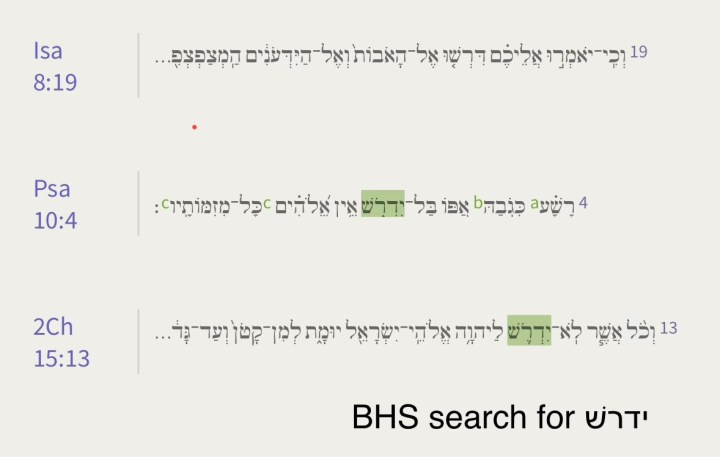
The root here is דרש, the “seek” part of the PaRDeS acronym for levels of meaning in Scripture (see post 12. Levels of Meaning). ידרש is the imperfect form.
⦁ Isaiah 8:19
19 And when they say to you, “Inquire of the mediums and the necromancers who chirp and mutter,” should not a people inquire ידרש of their God? Should they inquire of the dead on behalf of the living?
⦁ Psalms 10:3-4
3 For the wicked boasts of the desires of his soul,
and the one greedy for gain curses and renounces the LORD.
4 In the pride of his face the wicked does not seek ידרש him;
all his thoughts are, “There is no God.”
⦁ 2 Chronicles 15:12-13
12 And they entered into a covenant to seek the LORD, the God of their fathers, with all their heart and with all their soul, 13 but that whoever would not seek ידרש the LORD, the God of Israel, should be put to death, whether young or old, man or woman.
- (Always look at context for better understanding. Here, best to read the entire chapter. This is about very strict “religious reform.”)
▸ h7381. רֵיחַ rêaḥ; from 7306; odor (as if blown): — savour, scent, smell.
AV (58) – savour 45, smell 11, scent 2;
- scent, fragrance, aroma, odour
- scent, odour
- odour of soothing (technical term for sacrifice to God)
Another important word is the word for foot רגל. You can see it is very common:
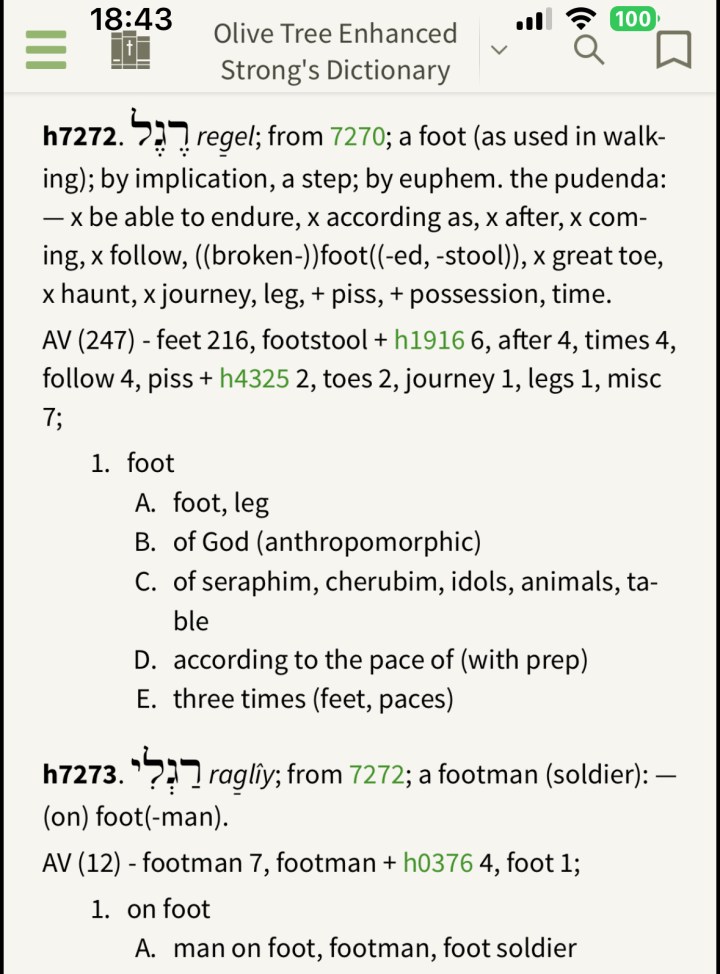
And its verbal root, which leads one to think more about the noun formed from it:
▸ h7270. רָגַל râg̱al; a primitive root; to walk along; but only in specifically, applications, to reconnoiter, to be a tale-bearer (i.e. slander); also (as denominative from 7272) to lead about: — backbite, search, slander, (e-)spy (out), teach to go, view.
AV (25) – spy 12, spy out 8, view 2, backbiteth 1, espy out 1, slandered 1;
- to go on foot, spy out, foot it, go about, walk along, move the feet
- (Qal) to be a tale-bearer, slander, go about
- (Piel)
- to slander
- to go about as explorer, spy
- (Tiphel) to teach to walk
⦁ Deuteronomy 11:24
24 Every place on which the sole (h3709. כַּף ḵap̱) of your foot (h7272. רֶגֶל reg̱el) treads shall be yours: from the wilderness and Lebanon, from the river, the River Euphrates, even to the Western Sea, shall be your territory.
⦁ Joshua 1:3
3 Every place that the sole (h3709. כַּף ḵap̱) of your foot (h7272. רֶגֶל reg̱el) will tread upon I have given you, as I said to Moses.

I show the following passage for two distinct reasons. There may be many more “hidden messages” in these verses, that we will not discuss here today other than the highlights. But first, see in the screenshot from NKJV below (at least they are honest to show what was added in) the words in italics. See how these added words lead us along a certain path of thinking. Psalm 68:19 was a referred-to verse in a daily devotional. There was no other context, there are these added words. And no telling what else. I am simply trying to show the reader to be one who looks at other possibilities. I suppose the entire process I am using in the website is an “uncovering” of sorts. Some added words are totally innocuous, and clearly to make the English read more easily. But some could be a reflection of a certain worldview or bias. What we really need to hear in our Bible is what was written, not someone’s commentary or opinion about what was written. In post 04. Interpretation Overview, we tried to make clear the approach of letting Scripture speak directly to us before going to a commentary. This same principle applies here. See what it “really” says and meditate on that. As Strauch says, he may write it on paper and carry it around for a week.
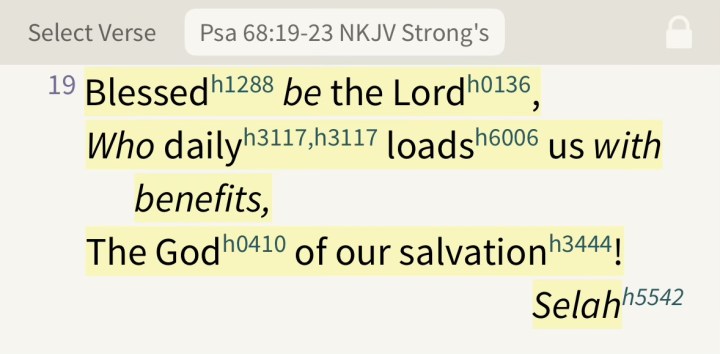
Believe, for certain, there is even more context that would add to your consideration, but here I widen the angle of the lens slightly.
⦁ Psalms 68:17-19 NKJV
17 The chariots of God (are) twenty thousand,
(Even) thousands of thousands;
The Lord is among them (as in) Sinai, in the Holy (Place).
18 You have ascended on high,
You have led captivity captive;
You have received gifts among men,
Even (from) the rebellious,
That the LORD God might dwell (there).
19 Blessed be the Lord,
(Who) daily loads us (with benefits),
The God of our salvation!
Selah
⦁ Psalms 68:18-20
18 רֶ֤כֶב אֱלֹהִ֗ים רִבֹּתַ֣יִם אַלְפֵ֣י שִׁנְאָ֑ן אֲדֹנָ֥י בָ֝֗ם סִינַ֥י בַּקֹּֽדֶשׁ׃
19 עָ֘לִ֤יתָ לַמָּרֹ֨ום ׀ שָׁ֘בִ֤יתָ שֶּׁ֗בִי לָקַ֣חְתָּ מַ֭תָּנוֹת בָּאָדָ֑ם וְאַ֥ף סֹ֝ורְרִ֗ים לִשְׁכֹּ֤ן ׀ יָ֬הּ אֱלֹהִֽים׃
20 בָּ֤ר֣וּךְ אֲדֹנָי֮ יֹ֤ום ׀ יֹ֥ום יַֽעֲמָס־לָ֗נוּ הָ֘אֵ֤ל יְֽשׁוּעָתֵ֬נוּ סֶֽלָה׃

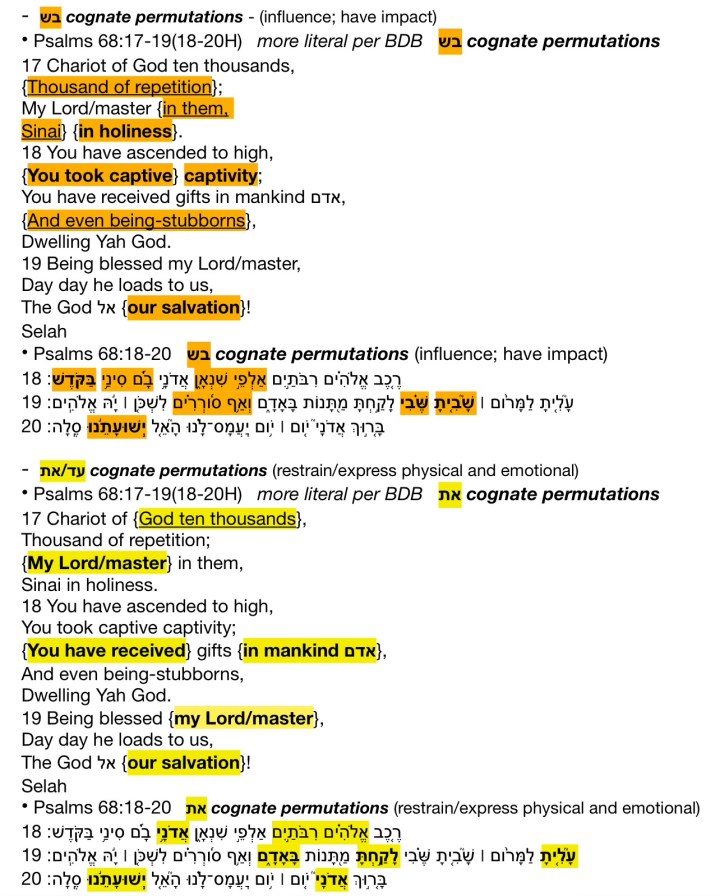
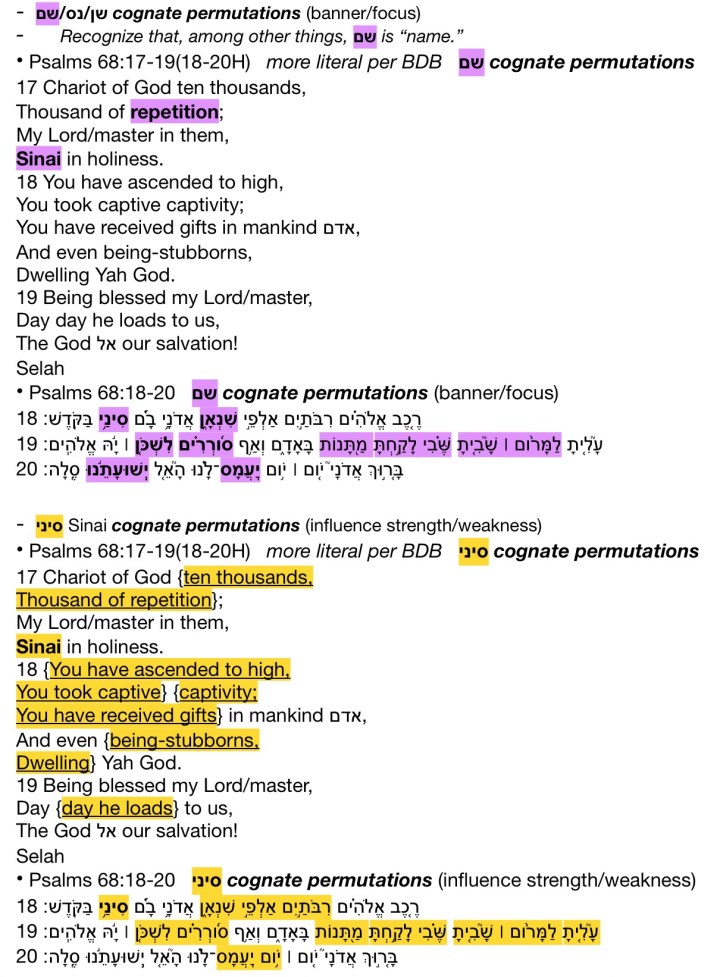
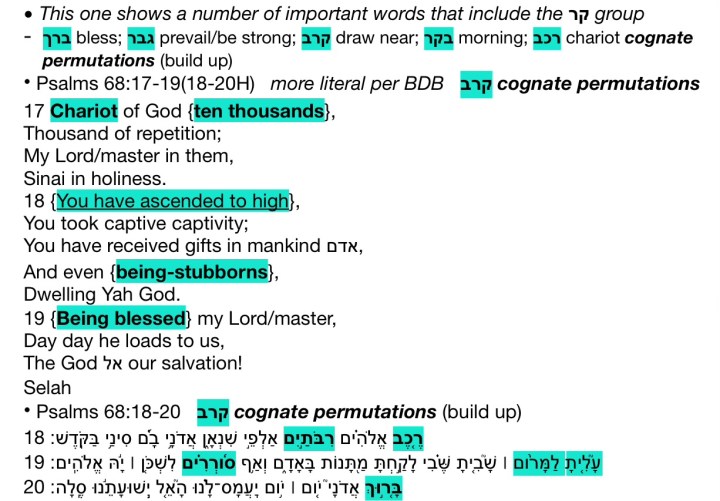
My Lord/my Master daily loads me. He loads me with life situations designed to teach. He may load me with benefits (as was added), but he may also load us with challenges. It is in both that we are to learn. (See Philippians 4:12). There are ups and there are downs. (((And please see this could also be referring to earthly masters that “load” us.)))
Cycles are purposeful… cycles limit/restrict growth. The times of heat promote growth (of course water and nutrients are also required). Cycles of cold slow or temporarily halt growth. See how often the קר group appears.

Look especially at this word “purpose” יצר. Yeshua/Jesus spoke about the purposes in our heart in the section of the Sermon on the Mount about “adultery in the heart.” Paul picks up the message about evil intent in 1 Corinthians 10, where he refers to the devastation of the people in the wilderness having evil intent. This evil intent is pointed out as being idolatry, referring (NKJV reference) especially to Exodus 32:6-9.
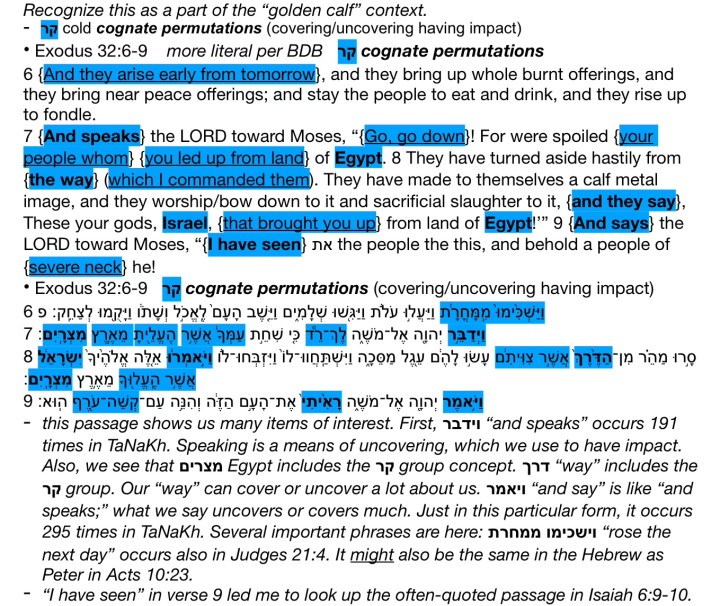
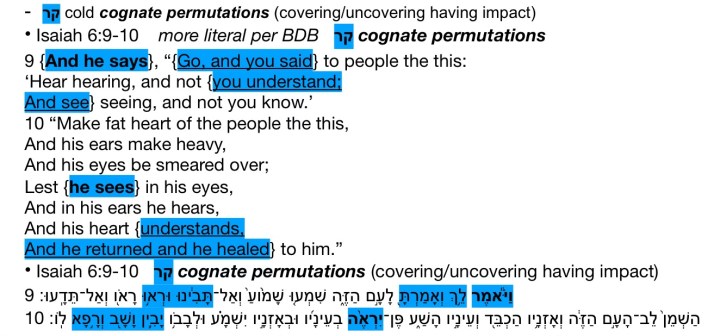
- These passages and this קר group (covering/uncovering having impact) are particular reminders to us to look within ourselves. When we do this we may find particular beliefs, “idols” that we hold onto. These are the Logs in our eyes to be removed, that greatly affect our judgment. Matthew 7:1-4.
- It is this “seeing” referred to in Isaiah 6:9-10; and from ESV: [ Isaiah 6:9 Cited Matt. 13:14, 15; Acts 28:26, 27; [Mark 4:12; Luke 8:10; Rom. 11:8 ]
One critical word from this group, seen above, but to make certain you recognize here is “Atonement” כפר.
We are in the time of the High Holy Days in Judaism. Depending on which calendar is followed, Yom Kippur, the Day of Atonement, is upcoming soon: this from the websitetimeanddate.com,
“A Time To Right Wrongs
Yom Kippur is considered the ideal time in the Jewish calendar to repent and start the new year cleansed of sin.
The traditional belief is that God writes one´s fate into the Book of Life on the Jewish New Year and worshipers have the ten day period between that day, known as Rosh Hashana, and Yom Kippur to atone for sins and pray for forgiveness.
At the end of Yom Kippur, it is said that God seals the Book of Life and one’s fate is set for the coming year.”
Yom Kippur 2025 in the United States
It is a day of uncovering ourselves to the LORD, which first requires our own recognition. And the recognition within ourselves should lead us to a new direction, a turning around, a repentance. Perhaps that turning can really only come with truly “seeing;” with removing the Log. Our “uncovering” to him leads to a turning, and to a “covering” by the LORD.
Many blessings,
PG
Ⓒ Copyright Philip E. Gates; LogAndSpeck.com September 2025